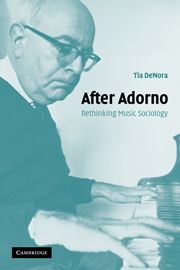Book contents
- Frontmatter
- Contents
- List of figures
- List of music examples
- Preface: a two part invention
- Acknowledgements
- A note on background reading
- 1 Adorno, ‘defended against his devotees’?
- 2 New methods and classic concerns
- 3 Music as cognition
- 4 How does music ‘channel’ emotion?
- 5 Music and ‘control’
- 6 After Adorno: rethinking music sociology
- Bibliography
- Index
3 - Music as cognition
Published online by Cambridge University Press: 22 September 2009
- Frontmatter
- Contents
- List of figures
- List of music examples
- Preface: a two part invention
- Acknowledgements
- A note on background reading
- 1 Adorno, ‘defended against his devotees’?
- 2 New methods and classic concerns
- 3 Music as cognition
- 4 How does music ‘channel’ emotion?
- 5 Music and ‘control’
- 6 After Adorno: rethinking music sociology
- Bibliography
- Index
Summary
Just as Adorno was not a sociologist ‘of’ music, so too, his focus on the history of consciousness transcended what is typically termed the sociology ‘of’ knowledge. Knowledge, in the sense of propositions (as in ‘what’ is to be known) was never Adorno's primary quarry. He was concerned rather with historical styles of cognition – habits and attitudes of mind and modes of attention to the world. Within this focus, knowledge formation in the sense of the production of ‘facts’ was conceived as a ceaseless process. One could never rest upon formulations because, in so far as all cognition was an attempt to accommodate (as opposed to approximate) reality, it was, inevitably, always moral. And, within that activity, aesthetic forms provided exemplars, structures of attention and thus ways of ‘handling’ awareness of the material world. For Adorno, aesthetic experience was part of the matrix from which consciousness was formulated and his admiration for Schoenberg makes this clear: if we pursue his line of thinking, music emerges as nothing less than a medium through which modes of attention are formed. It was in this sense that music was an active ingredient in the formation of consciousness and thus of knowledge formation.
This idea is nothing if not intriguing. But to what extent is it possible to specify this issue in terms of actual modes of consciousness in particular locations? Is it possible to reveal the processes by which music comes to inform knowledge production? Can they be observed in cognitive praxis?
- Type
- Chapter
- Information
- After AdornoRethinking Music Sociology, pp. 59 - 82Publisher: Cambridge University PressPrint publication year: 2003



